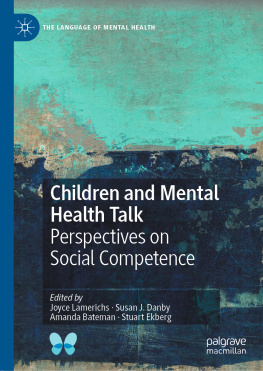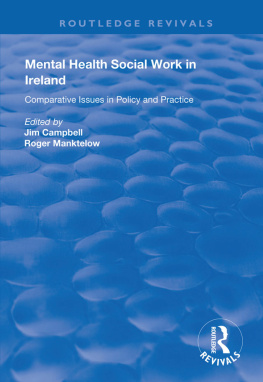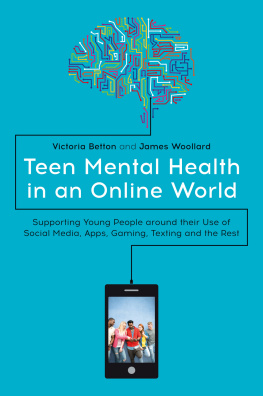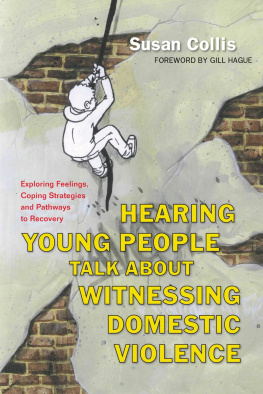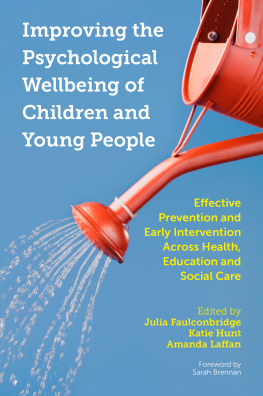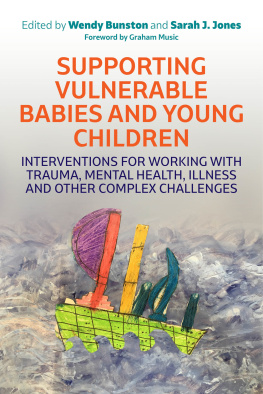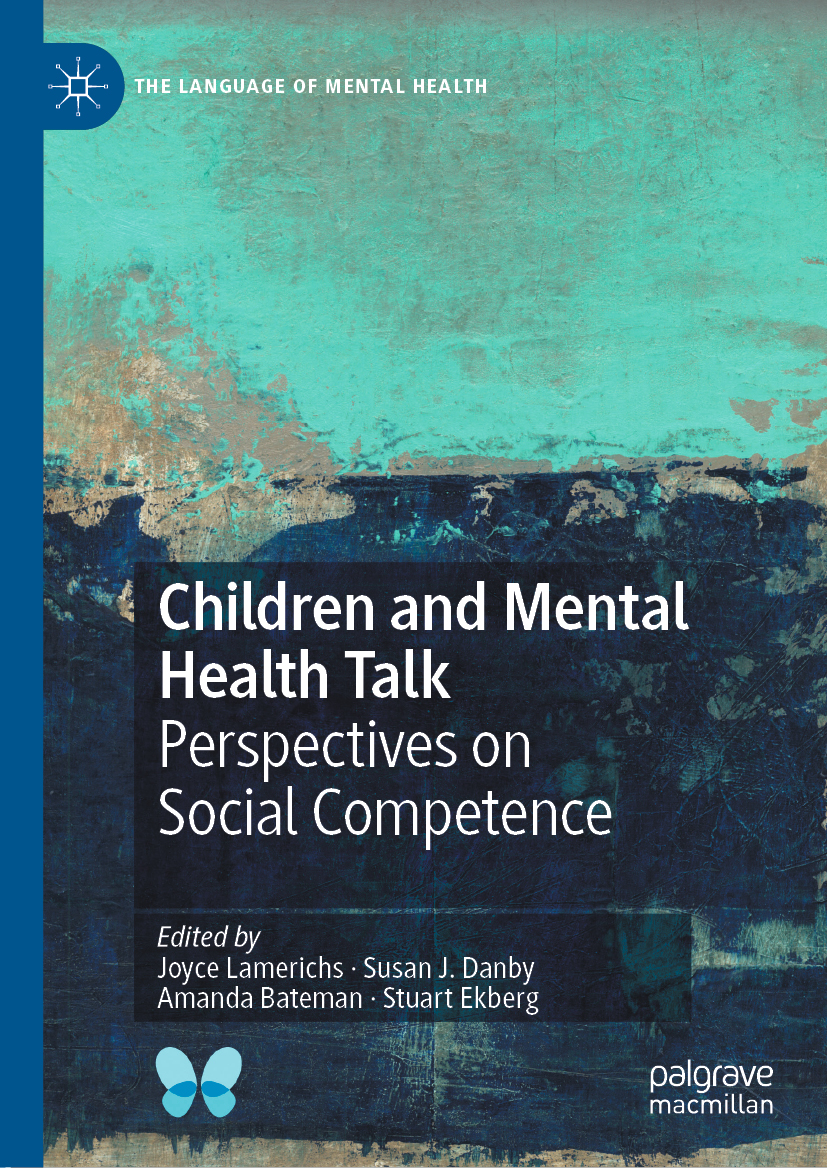The Language of Mental Health
Series Editors
Michelle OReilly
The Greenwood Institute, University of Leicester, Leicester, UK
Jessica Nina Lester
School of Education, Indiana University, Bloomington, IN, USA
This series brings together rich theoretical and empirical discussion at the intersection of mental health and discourse/conversation analysis. Situated broadly within a social constructionist perspective, the books included within this series will offer theoretical and empirical examples highlighting the discursive practices that surround mental health and make real mental health constructs. Drawing upon a variety of discourse and conversation analysis perspectives, as well as data sources, the books will allow scholars and practitioners alike to better understand the role of language in the making of mental health.
Editorial Board
We are very grateful to our expert editorial board who continue to provide support for the book series. We are especially appreciative of the feedback that they have provided on earlier drafts of this book. Their supportive comments and ideas to improve the book have been very helpful in our development of the text. They continue to provide support as we continue to edit the book series the language of mental health. We acknowledge them here in alphabetical order by surname.
Tim Auburn, Plymouth University, UK
Galina Bolden, Rutgers University, USA
Susan Danby, Queensland University of Technology, Australia
Debra Friedman, Indiana University, USA
Ian Hutchby, University of Leicester, UK
Doug Maynard, University of Wisconsin, USA
Emily A. Nusbaum, University of San Francisco, USA
More information about this series at http://www.palgrave.com/gp/series/15193
Editors
Joyce Lamerichs , Susan J. Danby , Amanda Bateman and Stuart Ekberg
Children and Mental Health Talk
Perspectives on Social Competence
Editors
Joyce Lamerichs
Department of Language, Literature and Communication, VU University Amsterdam, Amsterdam, Noord-Holland, The Netherlands
Susan J. Danby
School of Early Childhood and Inclusive Education, Queensland University of Technology, Brisbane, QLD, Australia
Amanda Bateman
Swansea University, Swansea, UK
Stuart Ekberg
School of Psychology and Counselling, Queensland University of Technology, Brisbane, QLD, Australia
The Language of Mental Health
ISBN 978-3-030-28425-1 e-ISBN 978-3-030-28426-8
https://doi.org/10.1007/978-3-030-28426-8
The Editor(s) (if applicable) and The Author(s), under exclusive license to Springer Nature Switzerland AG 2019
This work is subject to copyright. All rights are solely and exclusively licensed by the Publisher, whether the whole or part of the material is concerned, specifically the rights of translation, reprinting, reuse of illustrations, recitation, broadcasting, reproduction on microfilms or in any other physical way, and transmission or information storage and retrieval, electronic adaptation, computer software, or by similar or dissimilar methodology now known or hereafter developed.
The use of general descriptive names, registered names, trademarks, service marks, etc. in this publication does not imply, even in the absence of a specific statement, that such names are exempt from the relevant protective laws and regulations and therefore free for general use.
The publisher, the authors and the editors are safe to assume that the advice and information in this book are believed to be true and accurate at the date of publication. Neither the publisher nor the authors or the editors give a warranty, expressed or implied, with respect to the material contained herein or for any errors or omissions that may have been made. The publisher remains neutral with regard to jurisdictional claims in published maps and institutional affiliations.
Cover illustration: Elena Ray/Alamy Stock Photo
This Palgrave Macmillan imprint is published by the registered company Springer Nature Switzerland AG
The registered company address is: Gewerbestrasse 11, 6330 Cham, Switzerland
Preface
This collection has arisen out of many years of shared research interests in exploring how childrens social competence plays out in different institutional settings. We each have been involved in undertaking research in which a childs well-being and mental health constitute a focus of those investigations. Broadly within the contributions of this book, the authors present detailed analysis of naturally occurring social encounters based on interactions that involve children in a range of clinical, non-clinical and research settings . The focus of this book marks a watershed moment in that we attend to both the research component of understanding childrens interactional competence in situ and also the role of the professional through their reflections.
This book grew out of seminars, activities and professional development programs for researchers and professionals to reflect together on research and professional insights. A seminar held at Queensland University of Technology in October 2016 titled Who is the expert here? (led by Susan Danbyand Stuart Ekberg) brought together researchers and professionals to share and reflect upon the research undertaken within a range of health and educational settings. The researchers discussed how their collaborations with the practitioners enriched the research practices, and the professionals considered what this might mean for their professional practices (e.g., see Houen, 2017). This approach optimises the usefulness of bringing together researchers and professionals to share their thinking in ways that produce more explanatory power than a single approach alone can do (McWilliam, 2012).
The power of these research-practice nexus conversations challenges existing ways where research may be privileged over practice. The conversations of professional reflections are consistent with the ongoing rise of applied conversation analysis (Antaki, 2011). While Harvey Sacks early work (1992) with the suicide prevention centre may be considered an example of applied conversation analysis , more recent initiatives more formally connect research with practice and, importantly, explicate the many lessons learned when working closely together with organisations (Kitzinger, 2011). There are complexities and difficulties, and possible discrepancies can exist between the language of professionals and the language of researchers using ethnomethodological and conversation analysis approaches (Perkyl& Vehvilinen, 2003). For researchers, it is important to learn and engage with the language of professionals , to be able to communicate the findings from conversation analyses in ways that are recognisable and relevant to the organisation (Kitzinger, 2011).
Perhaps the most well-known method in the field of Conversation Analysis for using empirically based conversation analytic evidence to understand communication within organisations is the Conversation Analytic Role-play Method (CARM) (Stokoe, 2014). This approach uses audio and video recordings of actual encounters and then overlays these with a framework to discuss and understand how practitioners go about their mundane everyday work activities. This approach is a model of professional development that has produced new understandings to support practitioners and organisations to engage in effective communication practices. Building on CARM (Stokoe, 2014), others have brought together researchers and professionals with the aim to improve workplace communication. For instance, Church and Bateman have designed a method to engage in practical work with early childhood teachers (Church& Bateman, 2019). Known as the Conversation Analysis in Early Childhood (CAiEC) approach, the CAiEC workshops ( https://www.caiecworkshops.com ) are philosophically structured within an interactional competence framework where teachers professional knowledge is valued, and research and practice meet in collaborative and constructive ways to explore early childhood teaching strategies. As with CARM, CAiEC workshops use video footage of real-life practice as a discussion point with professionals around how particular practices support childrens learning, stimulating reflection and informing both future practice and research. A similar focus on interactional strategies also is central to the Discursive Action Method (Lamerichs& te Molder, 2011), which has been used to invite adolescents and social workers to reflect on particular instances of their own talk and inspect the strategies they use. The method has since then been developed further and is currently used to guide different group of professionals to approach the communicative practices in which they engage as dialogical conversations (Aarts & Te Molder, 2017; see also https://www.centrumvoordialoog.nl ).

